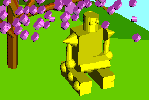

 I am Cyber Cat Robocom. JAPANESE
I am Cyber Cat Robocom. JAPANESECONTENTS

DREAM ELECTRONIC BOARD 'I WANT A DREAM ROBOT!'
Selections "I want a dream robot!" from Japanese version
ROBOT

VR (Virtual Reality)
Z80 Programming
Making Sumo Robo Diary
Java Technology
Japanese Robots
Japanese Robots2
Japanese Robots3
Japanese Welding Robots
Japanese Human Type Robots
Advanced Robot ARTRA
The History of Motion Control in Japan
Talk about Engineering
JOURNEY JAPAN
ACTIVE SUPER-JAPANESE (CHO-JISSEN NIHONGO) by Mike Kobayashi 2001
AIUEO"Japanese Alphabet Song" music by B DAYS ,2001
This song improves your Japanese pronunciation!
AIUEO(real audio) AIUEO(MP3)
A I U E O
Ka Ki Ku Ke Ko
Sa Shi Su Se So
Ta Chi Tsu Te To
Na Ni Nu Ne No
Ha Hi Hu He Ho
Ma Mi Mu Me Mo
Ya Yu Yo
Ra Ri Ru Re Ro
Wa N
From "How do you do?" to "Good bye!" in Japanese
"Ha・ji・me・ma・shi・te"
This "hajimemashite" is often used when you meet some person first time.
hajime means first and this is formal phrase.
Example
"Hajimemashite, E・RI・KKU desu."
(How do you do? I'm Eric.)
"Hajimemashite, SU・MI・SU desu."
(How do you do? I'm Smith.)
This "DESU" is very useful. You can say like
"TO・MA・TO desu"(It's tomato.)
"WA・TA・SHI desu"(It's me.)
"PU・RE・ZE・N・TO desu."(It's a present.)
"U・SO desu."(It's a joke.)
"HO・N・TO・U desu." (It's true.)
"I・TA・I desu."(I have a pain.)
AND "DESUKA?" IS VERY USEFUL!
You can say like
"TO・MA・TO desuka?"(It's tomato?)
"A・NA・TA desuka?"(It's you?)
"JI・KO desuka?" (Is it the accident?)
"HO・N・TO・U desuka?" (Is it true?)
"I・TA・I desuka."(Do you have a pain?)
You can make many many Japanese lines by using "DESU" and "DESUKA".
"O・Ha・YO- go・za・i masu"
good morning
ohayogozaimasu is formal phrase.
just "ohayo" informal
"KON-NI-CHI-WA"
phrase of good afternoon
"KON-BAN-WA"
phrase " good evening"
"O・YA・SU・MI NA・SA・I"
good night
oyasuminasai is formal phrase.
just "oyasumi" is informal
"O・GE・N・KI DE・SU KA?"
How are you?
genki means "good health".
o-genki is more polite than "Genki desu ka" or just "genki"
desu means "is".
Last of sentence "ka" question sentence.
"GEN・KI DESU"
genki desu means "I'm fine."
Do not say "O-genki desu" by yourself.
"SA・YO~U・NA・RA"
"sayonara" is famous for good bye. But it sounds like very English.
"SA・YO-U・NA・RA" sounds Japanese.
At store
" ----" (Wa) ARI-MA-SU KA?
"KITTE (WA) A・RI・MA・SU KA"
Do you have post stamps?
short "---", ARIMASUKA? is OK.
"O-sake arimasu ka?"-> Do you have sake?
"Denchi wa arimasu ka?"->Do you have a battery?
"A・RI・MA・SU"
I have.
"A・RI・MA・SE・N"
I don't have.
Same answers "ki-ra-shi-te-masu", "O-i-te-ma-sen"
" ----" (Wo) KU-DA-SA-I
"A・RE (Wo) KU・DA・SA・I"
I'll take that.
"kudasai" means give me "I'll take it" when you buy somthing, this phrase is very useful.
Ko・re wo kudasai -> Give me this.
kore means this.
So・re wo kudasai -> Give me it.
Sore means it(that) .
" ----" (Wa) I-RI-MA-SE-N
"KO・RE (Wa) I・RI・MA・SE・N"
irimasen means "I don't need"
"Fu・ku・ro wa irimasen" -> "I don't need package."
"Ko・i・bi・to wa irimasen" -> "I don't need lovers."
Buy a ticket at SHINKANSEN STATION
"SHIN-OSAKA ma・de, ji・yu・u-se・ki (de)"
No reserved seat ticket for Shin Osaka, please.
ma-de means "by" .
"Jiyuu seki" means non-resereved seat. "jiyuu" is free. "seki" is seat
"Shi・te・i・ se・ki" means reserved seat
"NAGOYA ma・de, ki・n・yen-seki (de)"
No smoking seat ticket for Nagoya, please.
kinyen(kinen) means "non smoking" So it is OK when you need non-smoking reserved seat.
Emergency
"TA・SU・KE・TE!"
Help!
"tasukete" or "tasukete kudasai" means Help.
"KA・JI DE・SU!"
It's fire.
kaji means fire
Use "Kaji desu!" or "Kaji da!"
"KE・I・SA・TSU WO YO・N・DE KU・DA・SA・I"
"KE・I・SA・TSU NI DE・N・WA SHI・TE KU・DA・SA・I"
Call the police.
KEISATSU means police.
DENWA means telephone.
"HYA・KU TO・U BAN SHI・TE KU・DA・SA・I" is OK.
HYA・KU TO・U BAN is #110 of police phone number in Japan.
"KYU-KYU-SHA WO YO・N・DE KU・DA・SA・I"
Call ambulance car.
"HA・I!"
"Yes" or "Well"
Japanese don't say "I・I・E"(No) much.
Anytime Japanese say "Hai".
But do not say "Hai" twice like "Hai, hai" . This is very rude.
"GA・N・BA・RI・MA・SU!"
I will do my best!
"A・RI・GA・TO・U・GO・ZA・I・MA・SU"
Thank you.
"Ganbarimasu."
"Arigatougozaimasu"
Those words, Japanese always say anytime, anywhere.
And "Do your best." in Japanese is
"Ganbattekudasai!"
Japanese Spring
Japanese Summer
Japanese Fall
Japanese Winter
Tokyo Friday's night
Okinawa
Strange Stones in Japan
MICHINOKU
OSAKA CITY
JOURNEY JAPAN
(AD)MOCHIDA COOKING SCHOOL TOKYO AREA tel03-3952-7139